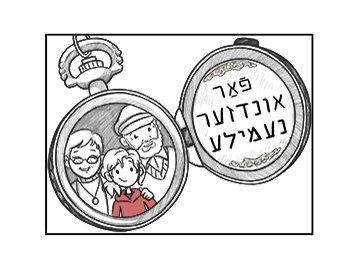
“Our Nomele” — Affectionate Suffixes for People’s Names
It is common in Yiddish to add a suffix of affect (indicating emotion) to a person’s name. This most often gives the name an endearing quality, indicative of family and other close relationships.
The most common of these suffixes are:
–ל, –עלע, –קע, –עניו, –שי
Affectionate forms of names are often used by parents, or any adult, when speaking about or to a child. They are also used by children among themselves.
As we see in the movie, Nomi’s grandparents call her נעמילע (“Nomele”). And Nomi expresses the same warm feelings by calling her grandmother באָבעניו or באָבעשי, and her grandfather זײדעניו or זיידעשי. (In this case the words באָבע and זײדע function as names.)
Meyerke’s name itself has an affectionate suffix — when he grows up, he most likely will be known simply as “Meyer”, and only his older relatives and his childhood friends like Nomi and Perl will still call him “Meyerke”. However, perhaps a particularly close friend will address him as Meyerke or with another affectionate form of his name, such as Meyerl, Meyerkele, Meyrenyu, or Meyrush.
A suffix of affect does not, however, always convey affection! The forms of well-known names of Biblical origin with these suffixes sometimes end up sounding quite different from the original and have often become names in their own right, without the connotations of childhood and affection. For example:
Yankev (Jacob) becomes “Yankl”, Bas-Sheve (Bathsheba) becomes “Bashe”, Mortkhe (Mordechai) becomes “Motl”, Refoel (Raphael) becomes “Falik”, Nesanel (Nethaniel) becomes “Saneh”, and Yisroel (Israel) becomes “Srulik”.
An affectionate suffix can be added to these names too, for example: Yankele, Bashenyu, Falikl.
In traditional Jewish society, a person’s “official name” was often considered more distinguished than its corresponding form with a suffix of affect, as we can learn from the saying:
Meaning: societal rules are applied differently for a rich, respected head of a household (Mr. Moyshe) than they are for a person in the working class (Moshke).
The association of these suffixes with professions considered lesser and other designations of low social status can also be seen in pairings such as: אַבֿרהמעלע מלמד (Avremele melamed, Avremele the Teacher) or מאָטקע גנבֿ (Motke ganev, Motke the Thief).
On the other hand, there are a number of cases where a suffix of affect indicates a spiritual intimacy with a highly respected person, for example, a Hasidic rebbe like Reb Mendele from Kotsk or Reb Dovidl Karliner. Perhaps the ultimate example of this is the intimate form of God’s name: “Gotenyu”!
For the use of the suffixes –ל and –עלע in diminutives, see 6.4 נאָך פּרטים.

